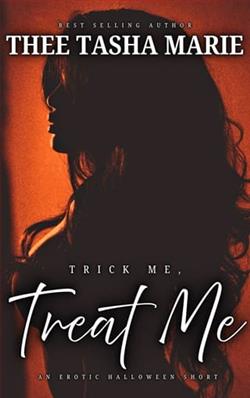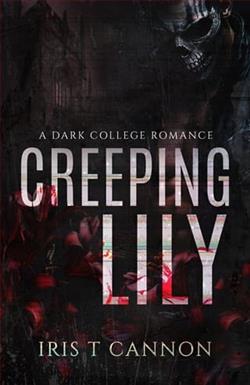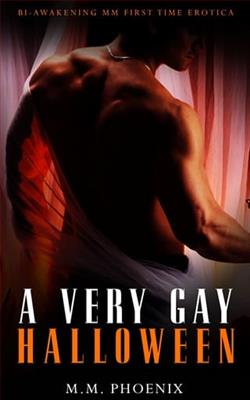Page 6 of Matches and Mistletoe
Thistle looked, and her stomach flipped. She did see. She saw a face, beautiful and wooden—carven, inanimate.
“That is my mother,” said the Felwitch. “Beside her is my father.” He pointed to a larger figure, one Thistle had mistaken for a thickset tree with massive branches.
She blinked, not sure she could trust her eyes. “What happened to them?”
“Time,” he murmured. “Time, and a curse. I was away from home when it happened. A group of druids ripped away my family’s magic and bound them to this forest, preventing them from approaching its borders. When I returned, they were already fading. I could do nothing to help them.”
“Fading? Why?”
“The Fae subsist on belief,” he said. “We were formed at the dawn of the human race, birthed from Nature Herself as benevolent guardians to teach and advise humanity. The idea was that we would exist only as long as humans believed in our magic. Once they moved past their need for us, we would return to Nature. Locked in this wood, my people were forgotten, and as belief in them waned, they began to succumb to the forest itself.”
He reached into the neck of his tunic, beneath his cloak, and pulled out a pale stone, swirled with strands of glowing green. “I have survived because I can leave the forest and show my power to humans. The people of Embry Hollow believe in my magic, therefore I continue to exist in this form.”
The Felwitch dangled the white stone over the fire, letting the crackling flames bathe it. Slowly the green glowing threads lifted from the stone’s surface, unspooling through the night air.
“My midwinter visits to your village allow me to collect enough belief to keep myself going for another year,” said the Felwitch. “And there is enough surplus faith to awaken my family for part of a single night—from midnight until dawn.”
The threads of glowing green spiraled through the air, darting into the thicket. They burrowed into the carven forms the Felwitch had pointed out. Two—no, three—four, five—six figures were shifting, changing, creaking to life. Thistle clamped both hands over her mouth as the figures rose, tall and vivid, no longer part of the woods, but breathing and blinking and glowing in the orange firelight. Each one wore a robe of holly leaves.
“My mother Ygraine,” said the Felwitch, rising. “My father, Manannán. My brother and his wife, and my sister and her wife. My family.”
“Elatha,” cried a tall woman to the Felwitch. She had chestnut hair like his, and eyes like the summer sky.
“Mother.” The Felwitch strode forward, wrapping her in a tight embrace.
He embraced the rest of his family as well, and they murmured joyful things softly to each other.
“But my son, you are not alone this time,” said Ygraine. Her eyes took in Thistle, from her well-worn boots to her unruly black curls. “Who is this woman?”
The Felwitch turned back to face Thistle. Color burned in his cheeks, and for a moment she thought he was the most beautiful creature she had ever seen.
“This is no one,” he said. “An Unwanted from the village I visit. She will be my assistant until I can find someone to take her off my hands.”
“Be kinder to the poor girl, brother,” chided a slim, raven-haired woman. “We understand what it is to be unseen and rejected. Come here, love.” She grasped Thistle’s hand in her slender fingers. “Tonight, you are part of the family.”
The Felwitch—Elatha—created another feast, grander and more luscious than the one he had produced for the people of Embry Hollow. This time there was an ornately carved wooden chair for everyone, even Thistle herself. They ate, and they drank, and they told wonderful stories the like of which Thistle had never heard. She devoured the tales, holding them inside herself, praying she might never forget them.
After a while, Elatha’s brother began to play on some pipes, and the Fae began to dance.
Thistle enjoyed dancing. The act of moving to the music freed her soul in a way nothing else could, except perhaps a good book. She threw herself into the maelstrom of flashing smiles and sharp ears and graceful limbs, until the cold and the dark and the trees whirled away, and she became dimly conscious that she was lying on the snow, with not only her own cloak but Elatha’s draped over her body.
She blinked, pushing herself upright. Pale dawn light had begun to filter through the treetops. Elatha stood near the edge of the clearing, whispering brokenly to someone in the thicket—a figure receding and stiffening. Once again, all the Fae had sunk back into their resting places and transformed into motionless figures. Part of the forest.
Elatha turned on his heel and strode rapidly past Thistle, snatching his cloak off her as he went. She scrambled to follow.
They did not speak much that day.
Over the next twelve months, Thistle transformed the chaotic workroom into an orderly space with shelves, bins, and boxes, each one neatly lettered with their contents. She cooked simple meals from the supplies in the pantry, since Elatha did not like to use his magic to conjure food every day.
“Conjured food tastes delightful, and it is filling enough,” he told her. “But it is not the same as real food. Living on conjured meals for too long is not healthy, even for the Fae. There must be genuine sustenance.”
Every week, she and Elatha mopped and dusted the house together. Those were her favorite days, though she would not let herself admit why.
Once she threw soapsuds at him while they were mopping the hall. He looked so comically surprised that she burst into laughter. He hadn’t smiled since the night he woke his family, but he smiled then—wide and delighted. He chased her along the slippery floor and when she fell, he tumbled on top of her and painted her eyebrows and nose with suds.
He stayed there a moment, while his smile and hers faded into a tense, warm awareness, a rapid flutter of heartbeats and hot breath.
Then he pushed himself up again and disappeared into his workroom.















